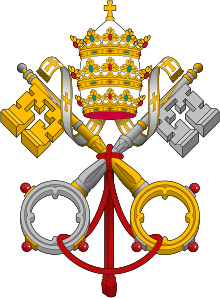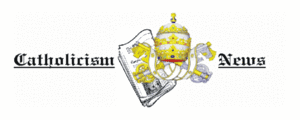Portal:Catholic Church
Introduction The Catholic Church, also known as the Roman Catholic Church, is the largest Christian church, with 1.39 billion baptized Catholics worldwide as of 2022. It is among the world's oldest and largest international institutions, and has played a prominent role in the history and development of Western civilization. The church consists of 24 sui iuris churches, including the Latin Church and 23 Eastern Catholic Churches, which comprise almost 3,500 dioceses and eparchies located around the world. The pope, who is the bishop of Rome, is the chief pastor of the church. The Diocese of Rome, known as the Holy See, is the central governing authority of the church. The administrative body of the Holy See, the Roman Curia, has its principal offices in Vatican City, a small independent city-state and enclave within the Italian capital city of Rome, of which the pope is head of state. The core beliefs of Catholicism are found in the Nicene Creed. The Catholic Church teaches that it is the one, holy, catholic and apostolic church founded by Jesus Christ in his Great Commission, that its bishops are the successors of Christ's apostles, and that the pope is the successor to Saint Peter, upon whom primacy was conferred by Jesus Christ. It maintains that it practises the original Christian faith taught by the apostles, preserving the faith infallibly through scripture and sacred tradition as authentically interpreted through the magisterium of the church. The Roman Rite and others of the Latin Church, the Eastern Catholic liturgies, and institutes such as mendicant orders, enclosed monastic orders and third orders reflect a variety of theological and spiritual emphases in the church. Of its seven sacraments, the Eucharist is the principal one, celebrated liturgically in the Mass. The church teaches that through consecration by a priest, the sacrificial bread and wine become the body and blood of Christ. The Virgin Mary is venerated as the Perpetual Virgin, Mother of God, and Queen of Heaven; she is honoured in dogmas and devotions. Catholic social teaching emphasizes voluntary support for the sick, the poor, and the afflicted through the corporal and spiritual works of mercy. The Catholic Church operates tens of thousands of Catholic schools, universities and colleges, hospitals, and orphanages around the world, and is the largest non-government provider of education and health care in the world. Among its other social services are numerous charitable and humanitarian organizations. (Full article...) Selected article
 The Roman Catholic Church in Nepal is part of the worldwide Roman Catholic Church, under the spiritual leadership of the Pope and curia in Vatican City. As of 2004 there are 7,105 Catholics in Nepal, organized into one Catholic jurisdiction known as an apostolic vicariate. Catholicism was first propagated in the 18th century, though from 1810 to 1950 no missionaries were allowed in Nepal. Since 1951, missionaries have again been allowed, though conversion to Christianity is still illegal. In 1983 a mission sui iuris covering Nepal was created, and in 1996 it was raised to an Apostolic Prefecture. The 1990 constitution did not guarantee religious freedom for Christians, but as of May 2006 Nepal has been declared a secular state and the constitution will likely be rewritten, leading to hopes that religious freedom may be established. On February 10, 2007, Benedict XVI elevated the prefecture of Nepal to the rank of a vicariate and appointed Anthony Sharma as the first vicar and first Nepalese bishop of the catholic church.
Selected image
 Oil-on-panel portrait of Sir Thomas More by Hans Holbein the Younger (1527)
Thomas More was a lawyer and political figure in 16th century England, best remembered as Henry VIII's Lord Chancellor. Selected biography
 Saint Gregory of Nazianzus (329 – January 25, 389), also known as Saint Gregory the Theologian or Gregory Nazianzen, was a 4th century Christian bishop of Constantinople. Gregory is widely considered the most accomplished rhetorical stylist of the patristic age. As a classically trained speaker and philosopher he infused Hellenism into the early church, establishing the paradigm of Byzantine theologians and church officials.Gregory made a significant impact on the shape of Trinitarian theology among both Greek-speaking and Latin-speaking theologians, and he is remembered as the "Trinitarian Theologian." Much of his theological work continues to influence modern theologians, especially in regard to the relationship among the three persons of the Trinity.
Did you know...
Related portalsFeast Day of May 27
Augustine was the prior of a monastery in Rome when Pope Gregory the Great chose him in 595 to lead a mission, usually known as the Gregorian mission, to Britain to Christianize King Æthelberht and his Kingdom of Kent from Anglo-Saxon paganism. Kent was likely chosen because Æthelberht commanded major influence over neighbouring Anglo-Saxon kingdoms in addition to his marriage to Bertha, a Frankish princess, who was expected to exert some influence over her husband. Before reaching Kent, the missionaries had considered turning back, but Gregory urged them on, and in 597, Augustine landed on the Isle of Thanet and proceeded to Æthelberht's main town of Canterbury. (Full article...)
Selected quote

News
SubcategoriesTopics
The Holy Bible:
Particular Churches (grouped by liturgical rite):
Things you can do
External resourcesWikiProjectsAssociated WikimediaThe following Wikimedia Foundation sister projects provide more on this subject:
Discover Wikipedia using portals |


































